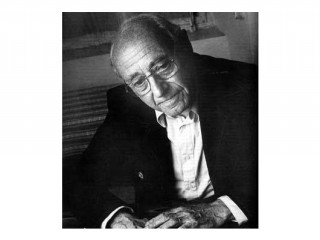
Josef Tal biography
Date of birth : 1910-09-18
Date of death : 2008-08-25
Birthplace : Pinne, German Poland
Nationality : Israeli
Category : Famous Figures
Last modified : 2011-08-11
Credited as : Composer and pianist, Hebrew operas, Der Turm, Der Garten
Josef Tal Israeli composer, pianist, and professor of music, allowed Middle Eastern music to influence him, but stayed in the mainstream of contemporary European music, in which tradition he had been trained.
Josef Tal (formerly Gruenthal) was born in 1910 in Pinne, near Poznan, German Poland. He studied composition and music education with Max Trapp and Heinz Tiessen at the Berlin Hochschule fur Musik. Other teachers there included Hindemith, Sachs, Kreutzer, and Saal. When the Nazis came to power in Germany, Josef Tal emigrated to Palestine. For two years he was an agricultural worker at Kibbutz Gesher.
Three years later, in 1937, Tal became a professor of piano and composition at the Academy of Music in Jerusalem. After the establishment of Israel as a sovereign nation the academy was renamed the Israel Academy of Music, and Tal became its first director, a post he held from 1948 to 1952. In 1950 Josef Tal added a professorship at the Hebrew University to his vitae and eventually became the first chairman of the Department of Musicology there. In 1961 he created the University Center for Electronic Music, an independent program.
Tal was the Israeli representative at International Society for Contemporary Music conferences and other musical events and attended a wide range of international conferences throughout the world. He received the International Society for Contemporary Music Festival Award in 1954, a UNESCO (United Nations Educational, Scientific, and Cultural Organization) research fellowship for the study of electronic music in 1957-1958, and two state prizes from his adopted country, Israel. Josef Tal belonged to the Israel Broadcasting Authority from 1965 to 1968 and was chairman of its musical committee. In 1969 he became a corresponding member of the Berlin Academy of Arts in West Germany; in 1971 he received a full membership in that organization (an ironic turn of history).
Josef Tal, unlike other contemporary eastern Mediterranean composers such as Paul Ben-Haim, did not make of Middle Eastern—in particular, Israeli—folk elements a compositional discipline. Tal was influenced by Middle Eastern elements, using the rhythms of Hebrew in his music, for example, but he maintained a contemporary European approach to composition. In addition to being the director of an electronic music institute, he was also Israel's leading composer of electronic, or electronically enhanced, music, holding a position somewhat analogous to that of Karlheinz Stockhausen in Germany. While he developed material from the Hebrew (the Christian Old Testament), Tal never cut himself off from his Central European roots nor ceased to identify himself with the ongoing tradition of European music, which music is, however, increasingly international in scope.
His early work—for example, his First Symphony (1952), his two string quartets, and his Cello Concerto— make use of the 12-tone row of the Second Viennese School of Schonberg, Berg, and Webern, but Tal avoided a strict application of serialist dictates in these compositions. However, his Five Methodical Piano Pieces are virtually didactic in their employment of dodecaphony, perhaps a reflection of Tal's career as a teacher more than his calling as a composer. Tal was also non-doctrinaire in his approach to electronic music, in which he was quite practical, believing there was no necessary conflict between what it is possible to perform and what a composer can envision. Tal's electronic music is especially noted for the complex sounds the composer was able to develop from a simple, limited use of electronic sources. Tal also firmly believed that all music, including electronic music, requires human participation. His approach to electronic music can be seen in his concertos for piano and tape, which are streamlined to allow a pianist to obtain concerto accompaniment at the touch of a button.
Tal's music is filled with drama and intense energy, created often by ostinato or sustained by an accretion of exciting textures. His popular Second Symphony and several dance compositions display complex rhythms. His musical and philosophical bent was perhaps best expressed in opera, most notably the full-scale, 12-tone Ashmedai, which was commissioned and first performed by the Hamburg Opera. Originally written with a Hebrew libretto, this music-drama tells a modern Jewish allegory which alludes to Nazi Germany. It is expressionistic in character and Wagnerian in its scope and its combination of artistic media. Another opera, electronic in style—Massada 967—was composed in honor of Israel's 25th anniversary. Tal's later works included, Der Turm (1987); Der Garten (1988); and Josef (1993). Through his compositions, as well as his work in theory and his teaching, Josef Tal had great influence upon the music of modern Israel. He remained for several years as department head and professor of Musicology at Hebrew University in Jerusalem.
















